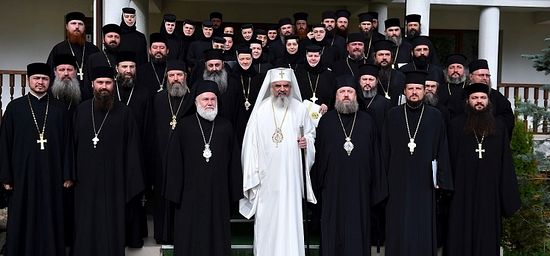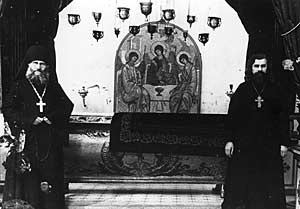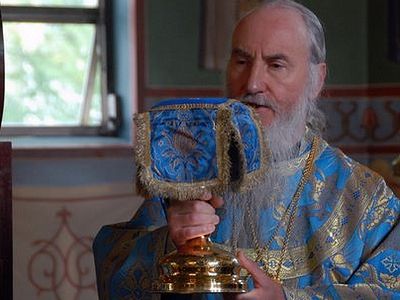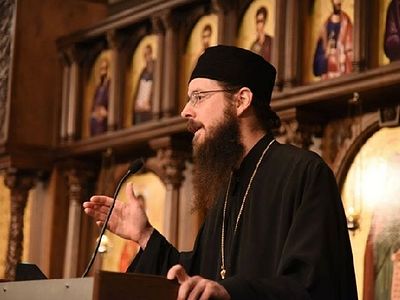October 6, 2015
Source: Basilica News Agency
The synaxis of abbots and abbesses in the Archbishopric of Bucharest and of the patriarchal stavropegic monasteries took place October 5—6, 2015, at the social and pastoral center of Caraiman Monastery, in Prahova County.
The subjects discussed were the mission of the parish and of the monastery in today's world, and also the life and work of St. John Chrysostom and of the great spiritual shepherds within their dioceses. The meeting was chaired by His Beatitude Daniel, Patriarch of Romania.
The main mission of monastics is to welcome pilgrims to the monastery
In his talk, His Beatitude Patriarch Daniel spoke about the mission of monastics in today’s society:
The mission of monastics isn’t to peregrinate from one place to another. There have been some situations when monastics were sent as missionaries to Christianize peoples, to strengthen the spiritual life where it had been weakened, but the main mission of monastics wasn’t travelling, but welcoming pilgrims to the monastery. Elder Cleopa wasn’t sent on mission to Africa or Asia, but he established order in some monasteries, through the disposition of Patriarch Justinian. At the same time, he became a missionary by welcoming the faithful and pilgrims to the monastery. He spiritually fed them with a word of spiritual benefit that was always based on the Holy Scripture and the writings of the Holy Fathers of the Church, and not on original ideas or personal opinions.
Let us bear witness to Christ’s love to the world
The Primate of the Romanian Orthodox Church also emphasized the fact that the role played by the monastic settlements is to bear witness to the true faith and the support of the needy:
The mission of the monastery is to be a witness to the true faith, the right way of living, and the support of the people who need good advice to enlighten their path in life, and encouragement. There is a time when we have to combine a word full of light with a good deed in order to bear witness to Christ’s love to the world, because Christ works through His mystical Body, the Church; especially monastic life represents a light, a guide for the life of the Church, as St John Chrysostom asserts, calling monasteries a refuge of calmness, prayer, of spiritual and joyful living.
The deeds and words of those living in monasteries represent until today a spring of living water
His Grace Visarion, Bishop of Tulcea was also present as a special guest at the monastic synaxis. In his speech he explained that nowadays monastics remain the hope of humanity, because they reveal the image of God to people who find themselves in full spiritual crisis:
The monastic is the angelic human about whom St John Climacus said that the angels are a light to monastics, while monastic life is a light to all humans. St John Chrysostom, the great Father of the Church, called the monastics of his time torches that illuminated the face of the entire earth and, at the same time defensive walls for the city, exhorting the faithful to go to monasteries and meet those who live there in order to receive spiritual benefit. That was because then, and both today, the faithful see in monastics fathers and mothers not according to the flesh, but according to the spirit, who spiritually bear and re-bear their fellow men, through their own spiritual birth, while their deeds and words remain until today a spring of living water.
His Grace Timotei Prahoveanul (of Prahova), assistant bishop to the Archbishopric of Bucharest, V. Rev. Archim. Veniamin Goreanu, administrative adviser at the Archbishopric of Bucharest, abbots, abbesses, hegumens and hegumenesses within the Archbishopric of Bucharest and of the patriarchal stavropegic monasteries also took part in this event.
The synaxis began with the Divine Liturgy at which His Grace Bishop Timotei Prahoveanul officiated.




